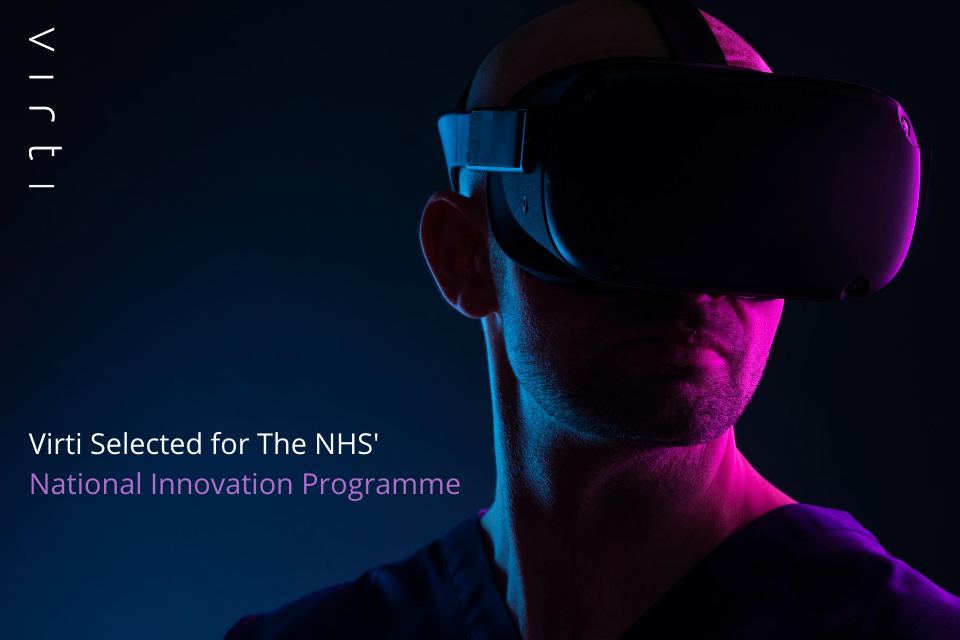Virti Selected for The NHS' National Innovation Programme

VR/AR training company and VRAwards winner Virti selected to join the UK National Health Service’s National Innovation programme.
Virti has been selected to join the UK’s nationally-celebrated NHS Innovation Accelerator (NIA) programme. Virti is the first and only evidence-based AR/VR training company to be selected onto the programme and deployed in the UK’s NHS which employs more than 1.5 million people..
Virti uses virtual and augmented reality combined with artificial intelligence to transport users into realistic, hard-to-access environments and safely assesses them under pressure to reduce anxiety and improve human performance and outcomes regardless of geographical boundaries. The system enables cost-reduction and scaling of in-person coaching and training for corporates and healthcare providers.
Virti came top in selection onto the 2017/18 Digital Health.London accelerator cohort and are also part of the Texas Medical Center’s Innovation Programme TMCx in Houston.
Virti was founded by trauma and orthopaedic surgeon Dr Alexander Young and only launched 12 months ago but in that short space of time have gained large enterprise customers in the UK and US and have won a number of high profile awards including the prestigious Royal College of Surgeons of Edinburgh Triennial Innovation Prize and, most recently, winning the VR Healthcare Category at the VR Awards.
The NHS employs more than 1.5 million people, putting it in the top five of the world’s largest workforces, together with the US Department of Defence, McDonalds, Walmart and the Chinese People’s Liberation Army. In healthcare training is vitally important with medical error one of the largest causes of avoidable death in Western Healthcare Systems and costing health providers upwards of $20bn in the US alone each year.
Now entering its fourth year, the NHS’ National Innovation Accelerator programme is designed to scale the top evidence-based health solutions throughout the National Health Service (NHS) and is delivered in partnership with England’s 15 Academic Health Science Networks (AHSNs). Since it launched in July 2015, the NIA has supported the uptake and spread of 37 high-impact, evidence-based innovations across more than 1,700 NHS sites.
Recruitment onto the NIA follows an international call and robust selection process, including review by over 100 clinical, patient and commercial assessors, and the National Institute for Health and Care Excellence (NICE).
Professor Stephen Powis, NHS Medical Director, said:
“The NHS Long Term Plan puts the latest technology and innovation at the heart of people’s care and the future of our health service. Right across the NHS patients are benefitting from world-beating innovations, spread as part of this programme.”
Dr Alexander Young, CEO/Founder Virti, said:
“It is a huge honour to be selected onto the NHS’ NIA programme and a testament to our ongoing work with the UK’s National Health Service. We are delighted to be the first Virtual and Augmented Reality company selected onto the NIA and proud that our evidence-based VR/AR training platform will now be scaled to further hospitals, physicians and patients through the NIA. We are particularly excited to help deliver the NHS’ recently published ‘Staff and Learner Wellness Strategy to 2027’ and further demonstrate the positive impacts that immersive technology can have on corporates, employees and for healthcare.”
Dr Séamus O'Neill, Chair of the AHSN Network, said:
“The NHS Innovation Accelerator is one of the flagship programmes of the NHS. We are very proud of the impact it is having in supporting innovators across the NHS and social care. Many very promising NIA innovations have benefitted from visibility and evidence generation through the AHSNs. It is gratifying too that we are already seeing a number of the NIA innovations getting traction in terms of adoption and spread with patient and population benefit as a consequence. We look forward to working with the new NIA Fellows over the coming months to develop and deploy these life-saving innovations at scale across the country.”
